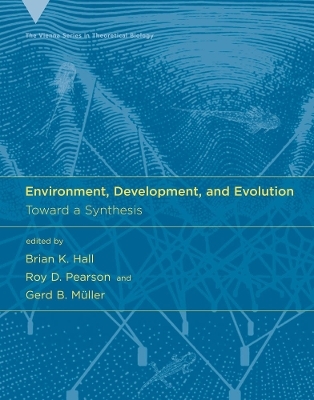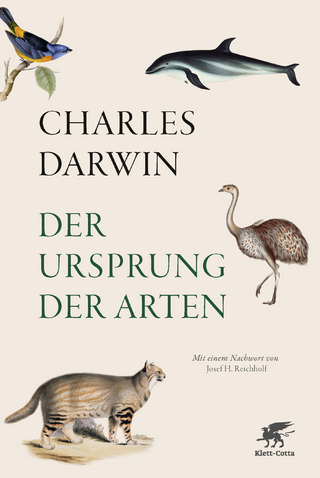
Environment, Development, and Evolution
Toward a Synthesis
Seiten
2003
Bradford Books (Verlag)
978-0-262-08319-5 (ISBN)
Bradford Books (Verlag)
978-0-262-08319-5 (ISBN)
- Titel ist leider vergriffen;
keine Neuauflage - Artikel merken
Leading researchers in evolutionary developmental biology seek linkages between, and a synthesis of, development, physiology, endocrinology, ecology, and evolution.
Evolutionary developmental biology, also known as evo-devo or EDB, seeks to find links between development and evolution by opening the "black box" of development's role in evolution and in the evolution of developmental mechanisms. In particular, this volume emphasizes the roles of the environment and of hormonal signaling in evo-devo. It brings together a group of leading researchers to analyze the dynamic interaction of environmental factors with developmental and physiological processes and to examine how environmental signals are translated into phenotypic change, from the molecular and cellular level to organisms and groups of organisms. Taken together, these chapters demonstrate the crucial roles of those processes of genetic, developmental, physiological, and hormonal change that underpin evolutionary change in development, morphology, physiology, behavior, and life-history.
Part I investigates links between environmental signals and developmental processes that could be preserved over evolutionary time. Several contributors evaluate the work of the late Ryuichi Matsuda, especially his emphasis on the role of the external environment in genetic change and variability ("pan-environmentalism"). Other contributors in part I analyze different aspects of environmental-genetic-evolutionary linkages, including the importance of alternate ontogenies in evolution and the paradox of stability over long periods of evolutionary time. Part II examines the plasticity that characterizes much of development, with contributors discussing such topics as gene regulatory networks and heterochronicity. Part III analyzes the role of hormones and metamorphosis in the evolution of such organisms with alternate life-history stages as lampreys, amphibians, and insects.
Evolutionary developmental biology, also known as evo-devo or EDB, seeks to find links between development and evolution by opening the "black box" of development's role in evolution and in the evolution of developmental mechanisms. In particular, this volume emphasizes the roles of the environment and of hormonal signaling in evo-devo. It brings together a group of leading researchers to analyze the dynamic interaction of environmental factors with developmental and physiological processes and to examine how environmental signals are translated into phenotypic change, from the molecular and cellular level to organisms and groups of organisms. Taken together, these chapters demonstrate the crucial roles of those processes of genetic, developmental, physiological, and hormonal change that underpin evolutionary change in development, morphology, physiology, behavior, and life-history.
Part I investigates links between environmental signals and developmental processes that could be preserved over evolutionary time. Several contributors evaluate the work of the late Ryuichi Matsuda, especially his emphasis on the role of the external environment in genetic change and variability ("pan-environmentalism"). Other contributors in part I analyze different aspects of environmental-genetic-evolutionary linkages, including the importance of alternate ontogenies in evolution and the paradox of stability over long periods of evolutionary time. Part II examines the plasticity that characterizes much of development, with contributors discussing such topics as gene regulatory networks and heterochronicity. Part III analyzes the role of hormones and metamorphosis in the evolution of such organisms with alternate life-history stages as lampreys, amphibians, and insects.
Brian K. Hall is University Research Professor and George S. Campbell Professor of Biology at Dalhousie University. Roy D. Pearson is with the Gerstein Science Information Centre at the University of Toronto. Gerd B. Mu ller, is Professor of Zoology and Head of the Department of Theoretical Biology at the University of Vienna and President of the Konrad Lorenz Institute for Evolution and Cognition Research.
| Reihe/Serie | Vienna Series in Theoretical Biology |
|---|---|
| Zusatzinfo | 47 illus. |
| Verlagsort | Massachusetts |
| Sprache | englisch |
| Maße | 178 x 229 mm |
| Gewicht | 649 g |
| Themenwelt | Naturwissenschaften ► Biologie ► Evolution |
| Naturwissenschaften ► Biologie ► Genetik / Molekularbiologie | |
| ISBN-10 | 0-262-08319-1 / 0262083191 |
| ISBN-13 | 978-0-262-08319-5 / 9780262083195 |
| Zustand | Neuware |
| Haben Sie eine Frage zum Produkt? |
Mehr entdecken
aus dem Bereich
aus dem Bereich
Komplette Neuübersetzung. Mit einem Nachwort von Josef H. Reichholf.
Buch | Hardcover (2018)
Klett-Cotta (Verlag)
48,00 €
Wie die Vernichtung der Arten unser Überleben bedroht - Der …
Buch | Softcover (2023)
Penguin (Verlag)
15,00 €


